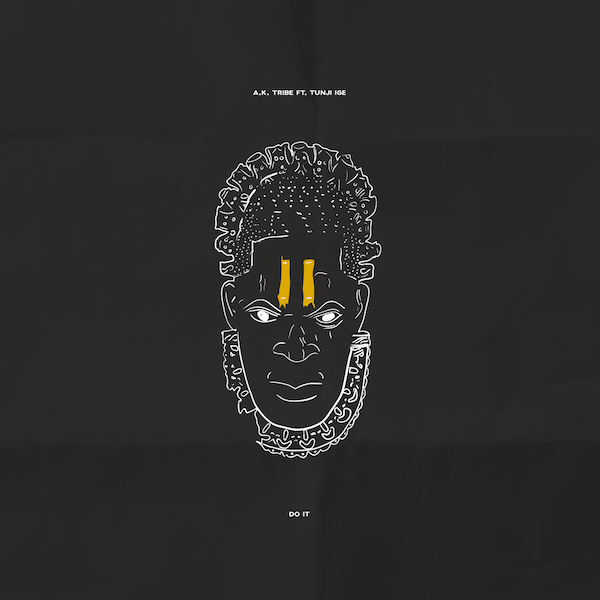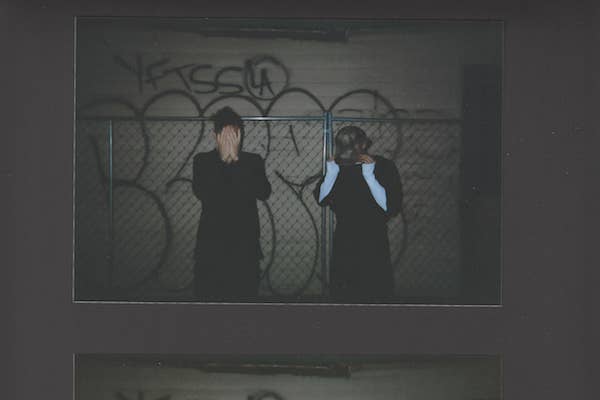1.

Image via A.K.Tribe
Daily Discovery is a feature that highlights a new or recently discovered artist who we’re excited about. See the rest of our Daily Discoveries here.
It’s easy (and a lot of the time, justified) to romanticize careers in in the music industry—earning a living by being creative is, for many, the dream. But sometimes the politics and pressures of music can make it as exhausting as your typical 9-5, leaving industry veterans in search of new outlets for self-expression.
Enter A.K. Tribe, an intentionally nebulous L.A.-based collective making eclectic, forceful trap/EDM/rock tracks that capitalize on its members’ industry cred without making that the focus. Their newest track, a banger called “Do It” (premiered below), features Tunji Ige in front of an unrelenting beat that never gets lost in its own crescendo.
Listen to the new single here, and read more in an interview with the collective’s two primary members below.
When did you start working together?
We started working together maybe like, two years ago. We’re both involved in different projects, and we just started making this music that we’d envisioned in our heads. It’s been really fun to do.
How did you first meet?
We had a bunch of mutual friends in the industry, and we’d worked on some projects together for other artists and other producers. We really clicked as people, and since we come from two different worlds—A.K. Tribe is like, there’s a bunch of people in it, but the majority of the production is done by the two of us. When we first met, we thought we could really do something special together.
How would you introduce the project to new listeners (obviously, that’s most people at this point)?
Primal. I think a big thing that we wanted to do with A.K. Tribe is take it back to the essential elements. We always end up with these big sounds—tons of drums, tons of music, tons of music, tons of everything. So with this, it’s all about getting back to the primal instinct. Getting back to the simplest things that make humans feel—with drums, there’s a beat, the heartbeat. Everyone wants to be pulled into this one central element, and I think that’s why everyone in general, no matter what kind of beat it is—it could be any tempo, any genre—people are drawn to the beat.
Stripping away all the other elements—like on “Do It,” we worked with Tunji, who’s an incredible rapper, a new up-and-coming guy. When we started the track, it was a completely different song.
When Tunji tracked to it, it was a whole other tempo, a different key, and a different beat all together. We had been hashing that out, and it just wasn’t clicking how we had envisioned it. So we scrapped literally everything except his vocals, and built it around what he was saying. We re-wrote it in our kitchen, which was really awesome.
We were working in like, really nice studios, trying to use all the bells and whistles—and then we ended up completing the song in the kitchen [laughs].
Without diving too far in, since you’re trying to maintain your anonymity, you both have a lot of experience in the industry, right?
Yeah, we’ve both been touring musicians for a number of years, and we’ve done a ton of production stuff. We worked on some big projects individually, in our own lives, and I think one of the things with A.K. Tribe was…the reason we’re keeping it about the music and not about us is not a PR thing. It’s just being involved in some of the bigger projects (which have been amazing)…it’s sad you see a great artist get slammed in the press, or painted as an asshole, or whatever it may be, and then people are judging their music through a filtered lens.
Everything’s filtered today—on Instagram, in Photoshop—so with A.K. Tribe, we don’t want to filter anything. We don’t want to filter the music, we don’t want to filter our pictures, we want to avoid all that and just keep about the art only.
I know you’re both based in L.A.—it really seems like that scene is popping off a little bit. How do you feel like being there impacts your work (or not)?
It’s funny—one of us never leaves the house, but the other tends to leave the house quite a bit. The L.A. scene—it’s interesting, because I feel like in the last couple years, it’s become something pretty cool whereas before that I think it was very fragmented. Everyone comes here to make it, everyone comes here to be someone, and then people tend to get caught up in that—in the lifestyle, rather than caught up in making art and taking from all the different people who come here.
There were a lot of other places with a lot of great musicians. The Chicago music scene has been really cool, especially in the hip-hop community, for a while now. I’ve spent a lot of time there working with some different Chicago artists. But in L.A. we were kind of lacking, and it’s really cool to see it now blossoming.
Given your diverse artistic backgrounds, what would you say are the main influences on this particular project?
I feel like any artist will sit here and say, “Well, we don’t want to be labeled by a specific genre.” I’m not trying to play that card.
But I feel like when this thing came about, we had been working on other things at the time—”Do It” is for sure the most accessible song at the moment, but the other stuff was really just like an experiment, in a completely different vein than what we were working on at the time. It just felt good to do something that wasn’t necessarily safe.
It was interesting starting out—when I heard these beats that [the other primary half of A.K. Tribe] was making, I was just like, “What is this?” At the time I was working on a hip-hop project, and they just made no sense to me. I could not wrap my head around what was going on—there was no structure whatsoever. There was just the craziest noises that almost hurt to listen to, but they were dirty and awesome and it felt good at the same time. Even though it hurt your ears to listen to, you wanted to turn it up all the way. It just knocked in your chest, everything was distorted…it was just ridiculous, and I’d never heard anything like that.
I think that was kind what influenced the project, just really dark, dirty, heavy-hitting music [with the addition of] what I do, which more hip-hop and pop. Giving it somewhat of a structure but still keeping that free-form grittiness and dirtiness.
Then, bringing in all our producer friends. We like to work with up-and-coming artists on the project as opposed to some of our more successful friends, because the up-and comers are the future. We want to foster that.
6.

How did you meet Tunji?
We met him through our friend Cody [Verdecias], who’s in A&R at Atlantic and also a member of [Queens rap collective] World’s Fair. He always seems to have his finger on such great talent, way before it pops off.
He’s been in a few rap groups, so I knew him from that—he’s turned me on to so many artists. Probably like four years ago, he put me in the studio with Travis Scott. This was before [Scott] really popped off. It was strange actually, because I think it was like on 4/20…there were like, so many people in the studio. But nobody knew who Travis Scott was then. He wasn’t signed to anybody.
Cody consistently comes up with those people, so when he told us about Tunji, it was like, “Alright, yep—this dude is dope.”
Tunji’s like the sweetest dude ever. When we got together, it was just so much fun.
Do you see yourselves staying anonymous into the future? Or do you think you’ll start performing live?
There’s a lot of music on deck right now. I think it’s always going to be a collaboration, either with the two of us, or four of us, or ten of us, and it’s always going to be that kind of collective creativity that we’re going to feed off of.
We’re the two who kind of started it, and head up the majority of the production, but there’s a lot of other people involved in the project, and going to be more people added to it. At the end of the day, it’s not about us—it’s about the music.
There are certainly plans further on down the road for a live show, and at some point, sure—maybe it will surface who all is involved with this. There’s always new people getting involved, so it’s fun. We have a lot of friends on the live/touring production side of things, and they come up with ideas for what we should do when we start playing out live. I think right now it’s just about getting some music to the masses. We’re taking baby steps.

